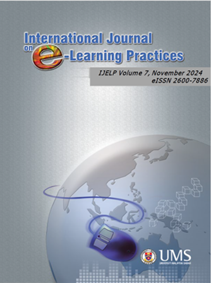FOSTERING ESL STUDENTS’ MOTIVATION IN WRITING THROUGH THE INTEGRATION OF ICT: A FOCUS ON TEACHERS AND STUDENTS
DOI:
https://doi.org/10.51200/ijelp.v7i1.5449Keywords:
ESL writing, motivation, ICT, impact, engagementAbstract
This study investigated the motivation in English writing by using the ICT in secondary school. The objectives of this study are to examine the impact of using ICT on ESL students’ motivation to engage in writing skills, and to explore how teachers incorporate ICT into ESL writing instruction to enhance motivation among students. This study used qualitative approach as the main approach by implemented semi-structured interview and open-ended questionnaire as the instruments. The total eight respondents including two secondary school English teachers age 31 and 46 years old meanwhile 6 secondary school students age 13 to 16 years old were participated in this research. The result reveal that ICT significantly enhances student motivation and engagement, making the learning more enjoyable and less monotonous, helping students clarify doubts and develop ideas more quickly especially in writing lesson. Implications of the study are where it enhanced student engagement and motivation, and improve learning and understanding in English writing lesson. Future research for this study is recommended due to the fact that majority of secondary schools in Malaysia such as rural area might need a better ICT implementation especially in English writing lesson. Addressing these issues could involve exploring how to improve ICT infrastructure, provide targeted professional development for teachers, and develop strategies to incorporate technology into curricula more effectively.
References
Alobaid, A. (2021). ICT multimedia learning affordances: role and impact on ESL learners’ writing accuracy development. Heliyon, 7(7), e07517. https://doi.org/10.1016/j.heliyon.2021.e07517
Pheng, K. T., Hashim, H., & Sulaiman, N. A. (2021). The use of technology in teaching of writing among Malaysian ESL secondary school teachers. Arab World English Journal, 7(1), 314–330. https://doi.org/10.24093/awej/call7.22
Saravanan, A., Palanisamy, L., & Aziz, A. A. (2021). Systematic Review: Challenges in Teaching Writing Skills for Upper Secondary in ESL Classrooms and Suggestions to overcome them. Malaysian Journal of Social Sciences and Humanities, 6(4), 262–275. https://doi.org/10.47405/mjssh.v6i4.749
Shan Fu, J. (2013). ICT in Education: A Critical Literature Review and Its Implications. International Journal of Education and Development using Information and Communication Technology (IJEDICT). https://files.eric.ed.gov/fulltext/EJ1182651.pdf
Steinmayr, R., Weidinger, A. F., Schwinger, M., & Spinath, B. (2019). The importance of students’ motivation for their academic achievement – replicating and extending previous findings. Frontiers in Psychology, 10. https://doi.org/10.3389/fpsyg.2019.0173
Wang, J., Liu, W. C., Kee, Y. H., & Chian, L. K. (2019). Competence, autonomy, and relatedness in the classroom: understanding students’ motivational processes using the self-determination theory. Heliyon, 5(7), e01983. https://doi.org/10.1016/j.heliyon.2019.e01983






